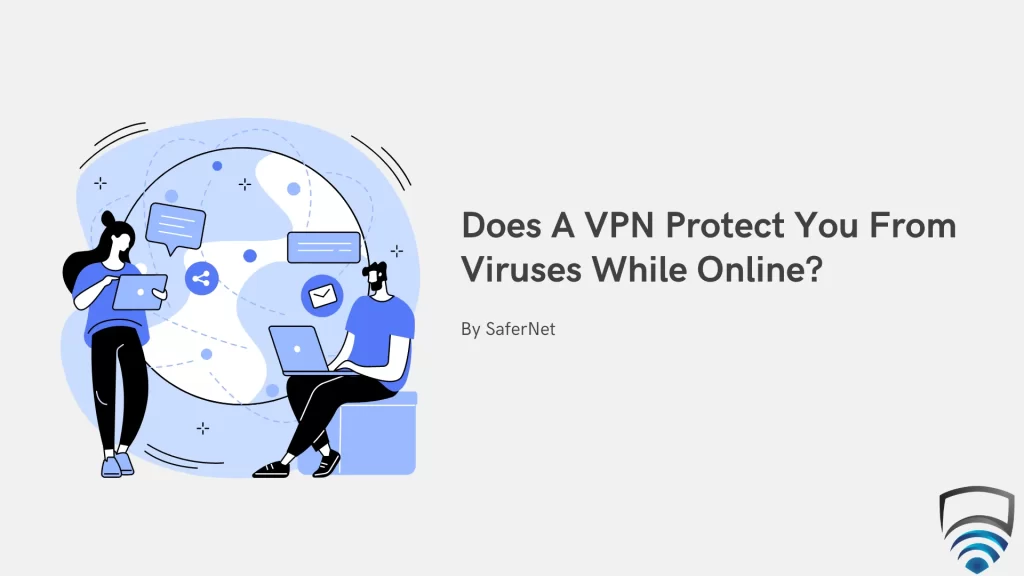
VPNs have become ubiquitous, but it’s important to look at how far their protection really goes. One of the most common questions when looking at this protection is “Does a VPN protect you from viruses while online?”
Before we answer that question, its important to understand what a VPN is, how a VPN works.
A VPN, or virtual private network, protects your activity and privacy online by using an encrypted, secure tunnel. While your connection is secured within these tunnels, trackers and third parties aren’t able to investigate your activity. This is because your device is always exchanging data with visted websites and other entities, however, a VPN obfuscates this information.
It’s important to know the tech behind a VPN, starting with ciphers. Understanding the tech is important when asking does a vpn protect you from viruses.
Ciphers are a critical component in VPNs. In simple terms, ciphers are a set of steps can be followed to ensure strong encryption and how this encryption is decrypted. The operation of a cipher depends on a key. Without knowledge of a key, decryption is difficult, and in most modern cases it is impossible. When considering does a VPN protect you from viruses while online, it is important to think about ciphers.

When looking at ciphers, we look at a mixture of the cipher and key-length, which means the amounts of bits in a key. Mostly commonly, this is 256 bits, which is the standard used by banks and the military. It would take billions of years to try every possible combination, so it is not feasible to crack a 256 bit cipher.
Over the years, there has been types of ciphers. Even today, there is a lot of options out there. However, for the purposes of this article, we’ll look at the two most popular ones today – RSA and AES. These are important to understand when considering does a vpn protect you from viruses.
RSA
RSA, or the Rivest-Sahmir Adleman cipher is a great cipher to look at when considering does a vpn protect you from viruses. It is asymmetric, and used in many applications. Though created it 1977, it didn’t see much use until 1997. Unlike many other ciphers, RSA uses both public and private keys as options for encryption, while the opposite will be chosen for decryption. This process ensures confidentiality, integrity, authenticity, and non-repudiation of electronic communications and data storage.
Browsers are the most common applications that use RSA, which is an added layer of protection when considering does a vpn protect you from viruses.
Much of the security of RSA balances around prime numbers, which are fairly watertight at current computing standards – Though this could prove to be a security risk with the advent of quantum computing.
When looking at VPNs, many do use RSA. While offering great security, the need to move to 2048 bit length has caused an already slow cipher type to become even more sluggish. Thus, it doesn’t provide an optimal VPN experience.
AES
The Advanced Encryption Standard, or AES, is the most popular encryption cipher and considered the gold standard of encryption. It is an exceptional choice when considering does a vpn protect you from viruses. It has mass-appeal, given its use by all levels of the US government, including the military. It is also used by every major bank globally.
It was developed in 1997 as a successor to a previous cipher, DES, which had began to age and show some flaws.
The National Institute of Standards and Technology (NIST) stated that the new algorithm would be “capable of protecting sensitive government information well into the 21st century.”. AES has three block ciphers: 128, 192, and 256 bit lengths.
Because of its use in all levels of government, it is extremely popular in industry, especially with VPNs.
The advent of quantum computing poses a far lesser threat to AES than it does to RSA. When considering does a vpn protect you from viruses, you should be looking a VPN that uses strong AES-256 cipher encryption, such as SaferNet.
VPN PROTOCOLS
As well as ciphers, when asking does a vpn protect you from viruses, another factor to consider is protocols. These are a set of instructions on how data is process between a VPN server and your device; it is the bedrock of a secure connection.
Protocols are quite different to one another, and give benefits to VPN users based on their circumstance.
Though there are many protocols, the most effective is OpenVPN, which is used by SaferNet to tackle the issue of does a vpn protect you from viruses.
SSL and TLS
SSL, and its successor, TLS, were invented in the 90s. Both are used to handle web transactions, in particular with regards to eCommerce, and thus were instrumental at the time. However, both can be used to protect any type of network traffic.
Both also benefit from the fact that they can travel through firewalls, providing applications are designed for SSL and TLS. As a result, many users rely on SSL and TLS to a large degree. Many VPN vendors use SSL somewhere in their DNA. Before VPNs were widespread, the question of does a vpn protect you from viruses wasn’t present due to SSL.
Connections rely on authentication of the endpoint the users is attempting to connect to, which is validated by a certificate. These certificates are vetted by certificate authorities.
SSL and TLS both took many years to develop. Though not as commonplace as they once were, they provide foundation technology to both VPNs and browsers. Due to their age they shouldn’t be considered when asking does a vpn protect you from viruses.

IKEv2/IPsec
IPsec is a suite of protocols, of which IKEv2 is a part of (and its predesessor, IKE). IPsec was developed to provide security through authentication through encryption.
At the time of release, IKE brought a lot of great features to IPsec, including automatic negotiation and authentication, anti-replay services, certification authority support and the ability to change encryption keys during an IPsec session.
IKEv2 brought further improvements to IKE, including:
-Less Bandwidth
-Less mathemtically mechanisms
-Needs just one initial exchange mechanism
-Supports mobile devices
-Supports the securing of Stream Control Transmission Protocol (SCTP) traffic
-Greater resistance to DDOS attacks
-Comes equipped with the built-in Network Address Translation (NAT)
While technically impressive, when asking does a vpn protect you from viruses, it shouldn’t be considered.
L2TP/IPsec
Layer 2 Tunnelling Protocol (LT2P) was developed by Microsoft, and as such is a proprietary protocol of the company. Similar to IKEv2, it is relient on and adds to IPSec. Though offering many benefits, it is not a good choice when considering it for a VPN as it is proprietary.
L2TP has also shown quite a bit of trouble navigating firewalls, which holds it back from being a contender in the VPN world. VPN providers generally shy away from LT2P. Though included in the list for its place amongst protocols, it is generally a nonfactor when asking does a vpn protect you from viruses.
Today, it is most seen on legacy devices that do not support OpenVPN, and so isn’t considerable when asking does a vpn protect you from viruses.
SSTP
Secure Socket Tunnelling Protocol (SSTP) is also a Microsoft-controlled VPN. Though offering many of the benefits of OpenVPN, it is only usable on Windows devices.
Furthermore, it is not open-source, which raises some security challenges. Microsoft has also cooperated previously with government entities such as the NSA, so isn’t a good option for individuals with privacy in mind.
Though offering good advantages for Windows users, when asking does a vpn protect you from viruses, we suggest steering clear of SSTP.
WireGuard
WireGuard is the new kid on the block when it comes to protocols, and may even prove to be OpenVPNs first true competitor if development continues as it has. Its creator, Jason Donenfeld, created the protocol specifically to challenge OpenVPN.
The creators argument was that OpenVPN is often too complex to implement for novice developers, and so may create a barrier to good security for smaller companies looking to get a start in the security business.
It is the youngest of the protocols, first being unveiled in 2017.
While OpenVPN will remain as the go-to protocol when figuring out does a vpn protect you from viruses, WireGuard may show up more often in the near future.
OpenVPN
OpenVPN is the most popular of VPN protocols and with good reason. It doubles as a software, allowing VPN companies to build their own stack on top of the already rock-solid base.
It was engineered by James Yonan in 2001, and is one of the few open source protcols to also feature an open source applications accompanying it. In fact, it was the first protocol to champion open source, giving full visibility to anybody who wishes to scrutinize it.
OpenVPN uses 256-bit OpenSSL encryption in most cases, however custom builds can use the AES, Camellia, 3DES, CAST-128, or Blowfish ciphers. It does not support L2TP, IPSec, or PPTP.
The protocol on software has gone through many public audits during its time, giving it further credibility. It is extremely trustworthy when asking does a vpn protect you from viruses.
One drawback is that its implementation can be complex, and so only advanced programmers can implement the base. It takes an even more talented team to build on OpenVPN, as SaferNet has done.
OpenVPN is also one of the few solid protocols available on almost any device. When asking does a vpn protect you from viruses, OpenVPN is your best choice, especially when paired with SaferNet.
VPN ADVANTAGES
While malware might be on your mind when considering does a VPN protect you from viruses, you might also consider the other advantages a VPN offers, including:
Remaining Anonymous Online – Your identity is easily traced when you aren’t using a VPN. This can be done by advertisers, ISPs, governments, and other third parties. With a VPN, thanks to the level of encryption you ordinarily wouldn’t have, your identity remains private.
Security on Public Networks – Though certainly related to does a VPN protect you from viruses, public networks provide a different set of dangers to you and your device. Using a public wifi network such as those found in restaurants, hotels, cafes, airports, bars, or city-wide networks can be extremely dangerous. Others who are connected to the network can do a considerable amount of snooping with the know-how while on these networks. Furthermore, there is a risk of man-in-the-middle attacks, where details you enter online such as passwords and banking credentials can be intercepted by others on the network. A VPN can easily secure your device while using a public network.
Overcoming ISP Bandwidth Limitations – ISPs have been known to limit their users bandwidth in order to make them upgrade their plan. VPNs can overcome this issue, because the data is obfuscated.
Internet Speed – VPNs can often damage internet speed, particularly when using geolocation features. However, this isn’t always the case. When using a VPN and not using these features speed can see an increase – which can be quite a lot when ISPs are attempting to throttle the connection.
There are many other advantages to using a VPN, and these are just some of the highlights.

Phishing is not a type of virus in itself, but rather a method for getting a device to become infected. In essence, it is a social engineering ploy to steal data and deploy further viruses. It is without a doubt the biggest attack vector for all types of malware including those mentioned above.
When a phishing attack takes place, it usually means a hacker is masquerading as a legitimate entity, and tricks the user into opening an email or text message, and convincing them to click a link or download malware. Phishing is a chief concern for does a vpn protect you from viruses.
A huge part of defending against phishing is education, but it doesn’t go far enough. Phishing has become more sophisticated over time, and can be difficult to spot even to the keenest eyes.

DOES A VPN PROTECT YOU FROM VIRUSES?
Sadly, the answer to this question in the majority of cases is No. Some of the most popular VPNs you see advertised have some, little, or no malware protection. This is not always the case, thankfully. Using a VPN for cybersecurity is becoming a more popular idea, and one of the earliest adopters of this line of thinking is SaferNet, which was engineered to present an option for those seeking out cybersecurity via VPN. Using a number of DNS-filtering and machine-learning driven features, SaferNet stands out from the crowd in terms of protecting its users from viruses while online. It is the answer to does a vpn protect you from viruses?
SAFERNET
When asking the question, does a vpn protect you from viruses while online, SaferNet is the only reasonable answer. While connected, all devices have 24/7 protection, and malware is held at bay. SaferNet is available globally, which means you have peace of mind wherever you are. When it comes to VPN protection, SaferNet is best-in-class.
Not only does SaferNet offer cybersecurity-enhanced VPN, it also offers Internet Controls for parental and employer use. It is the complete package, and the best choice for individuals, families, businesses, and organizations. With a simple and fast setup which can be completed in minutes, SaferNet can protect you from the threats of today and of tomorrow.